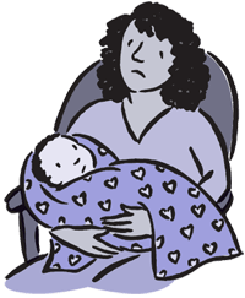
Depression is a serious medical illness; it's not something that you have made up in your head. It's more than just feeling "down in the dumps" or "blue" for a few days. It's feeling "down" and "low" and "hopeless" for weeks at a time.
There are several forms of depressive disorders. The most common are major depressive disorder and dysthymic disorder.
Signs & Symptoms
- Persistent sad, anxious, or "empty" mood
- Feelings of hopelessness, pessimism
- Feelings of guilt, worthlessness, helplessness
- Loss of interest or pleasure in hobbies and activities that were once enjoyed
Treatment
A variety of treatments including medications and short-term psychotherapies have proven effective for depression. Read more about how depression is detected and treated.
Getting Help: Locate Services
If unsure where to go for help, talk to someone you trust who has experience in mental health-for example, a doctor, nurse, social worker, or religious counselor. Ask their advice on where to seek treatment. If there is a university nearby, its departments of psychiatry or psychology may offer private and/or sliding-scale fee clinic treatment options. Otherwise, check the Yellow Pages under "mental health," "health," "social services," "suicide prevention," "crisis intervention services," "hotlines," "hospitals," or "physicians" for phone numbers and addresses. In times of crisis, the emergency room doctor at a hospital may be able to provide temporary help for a mental health problem, and will be able to tell you where and how to get further help.

Listed below are the types of people and places that will make a referral to, or provide, diagnostic and treatment services.
- Family doctors
- Mental health specialists, such as psychiatrists, psychologists, social workers, or mental health counselors
- Religious leaders/counselors
- Health maintenance organizations
- Community mental health centers
- Hospital psychiatry departments and outpatient clinics
- University- or medical school-affiliated programs
- State hospital outpatient clinics
- Social service agencies
- Private clinics and facilities
- Employee assistance programs
- Local medical and/or psychiatric societies
Locate Mental Health Services in Your Area
Within the Federal government, the Substance Abuse and Mental Health Services Administration (SAMHSA) offers a Services Locator for mental health and substance abuse treatment programs and resources nationwide.
 Print
Print Email
Email







